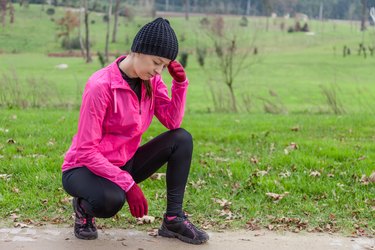
One minute you're running along without a care in the world — and the next minute, you're feeling woozy. There could be a simple answer: You're pushing yourself too hard. Or, factors beyond overexertion could also be involved.
Read more: Symptoms of Exercise Overexertion
Video of the Day
Video of the Day
Why Running Makes You Dizzy
Overexerting yourself while running, or exercising in general, can result in an uncomfortable lightheaded or dizzy feeling. You can blame it on science.
"When you run, your heart rate increases. Then when you stop, if your heart rate remains elevated but your muscles aren't effectively pumping the blood around your body, your brain might not get enough blood, and that will make you feel dizzy," says Jamé Heskett, MD, a family doctor and founder and medical director of the Well Path in New York City.
When you overexert, you may also not be getting enough oxygen as you breathe, and that lack of oxygen can also be responsible for a wave of wooziness, Dr. Heskett says. "The symptoms of dizziness after running can be mild, like you feel just a little off, as if you had been on a boat, to actual fainting," she says.
Aside from overexertion, a more serious reason for being dizzy or lightheaded after running is heat exhaustion — primarily if you're working out in the heat or wearing clothing that could make you overheated. "When you're too hot, your body tries to get rid of the heat by dilating your blood vessels," Dr. Heskett says. "This can cause less blood flow and less oxygen to your brain, which can make you dizzy."
Those symptoms could also be due to low blood sugar. According to Dr. Heskett, exercising can deplete your glycogen stores, leading to low blood sugar and feelings of lightheadedness. Harvard Health Publishing says the symptoms come about because, when you don't have enough blood sugar, your body goes on reserve in order to use the least amount of energy possible. That includes your brain, which can cause you to feel woozy.
Dehydration can also make you feel lightheaded, especially when you've been exerting yourself.
What to Do
If you're feeling lightheaded or dizzy after running or working out, first stop what you're doing. "Once you've stopped, sit down and try to have a sip of water — or even better, something with sugar and salt in it to combat low blood sugar or dehydration as a cause," Dr. Heskett says.
If your symptoms are due to overexertion, giving your body a break will help you feel normal again. If they're due to low blood sugar or dehydration, an electrolyte drink can be beneficial. The Cleveland Clinic says electrolyte drinks — which include sugar, sodium and potassium — help replenish your body when you lose too much fluid through sweating.
Specialty drinks for endurance athletes contain more potassium and sodium, along with other minerals such as calcium and magnesium. If you're not a fan of sports drinks, you can also reach for a natural electrolyte drink, like coconut water, says Cleveland Clinic.
How to Prevent the Problem
While knowing how to recover after feeling lightheaded or dizzy is important, make sure you're doing everything you can to prevent feeling that way in the first place. "Stay well-hydrated, wear appropriate clothing for the weather, don't exercise in the midday heat and start slow and build up to harder exercise," Dr. Heskett says.
If you really want to go the extra mile, you can also keep an eye on your heart rate during exercise. "That way, you can be sure it's in the appropriate range for your age and fitness level," she says. You can either buy a heart rate monitor or use your fitness tracker, or you can simply do things the old-fashioned way and check your pulse.
With these tricks up your sleeve, feeling lightheaded due to exercise will soon be a thing of the past.